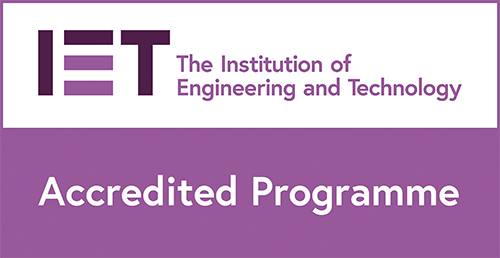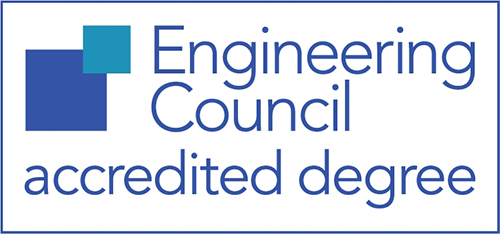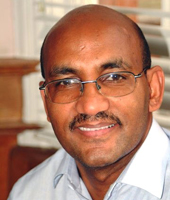Electrical and Electronic Engineering with Industrial Practice, MSc
Our MSc in Electrical and Electronic Engineering with Industrial Practice is ideal for forward-thinking graduates seeking career development in manufacturing or engineering management.
This master's programme helps to develop graduates into innovative professional engineers with a creative approach to problem-solving and a focus on efficient utilisation of current and emerging technologies. It will suit engineering and technology graduates who want to expand their skills or develop professional careers in electrical and electronic engineering related fields.
This two-year Electrical & Electronic Engineering degree with Industrial Practice is an innovative combination of theory and practice. You'll have the chance to put your learning into action through an individual project, followed by a placement with a relevant employer. The placement is an ideal opportunity to work and engage with state-of-the-art industrial systems, processes and practices while reflecting on your personal development.
On successful completion, you will emerge from this course as a well-rounded professional engineer. With a highly valued combination of in-depth knowledge and work experience, graduates of this programme have enhanced career prospects worldwide.
This programme has been designed for the International Market.
School
Location
Duration
2 years sandwich
Start month
September; January
Fees information
For fee information related to this course, please see fees section below
What you should know about this course
What you will study
Year 1
Students are required to study the following compulsory modules.
- Power Systems Analysis (15 credits)
- Technology Integration and Interfacing (15 credits)
- Design of Advanced Electronic Systems (15 credits)
- Embedded Electronics and Communications (15 credits)
- Individual Research Project (60 credits)
- Research, Planning and Communication (15 credits)
- Academic English for Postgraduates (Engineering)
Students are required to choose 45 credits from this list of options.
- Electrical Machines and Drives (15 credits)
- Machine Sensing (15 credits)
- Power Electronic Converters (15 credits)
- Human & Machine Robotics (15 credits)
- Strategy & Management (15 credits)
Year 2
Students are required to study the following compulsory modules.
- Individual Research Project (continued)
- Industrial Practice (60 credits)
About the course team
Our programme team and other contributors to the course are globally recognised specialists in their fields. Colleagues from industry deliver guest lectures each year as well as industry-relevant teaching sessions and seminars.
Come and meet us
We are offering virtual events so that you can still experience how Greenwich could be the right university for you.
Next Open Days
Got a question?
To find out more about our Open Days and Campus Tours or if you need any assistance, please email opendays@gre.ac.uk.
Entry requirements
An undergraduate (honours) degree at 2:2, or above, in Electrical/Electronic Engineering.
Applicants without a degree that have professional and vocational experience (e.g. incorporated engineer or chartered engineer status) may be considered if they demonstrate the potential to succeed on the course.
Applicants from other backgrounds may be considered.
Applicants are encouraged to obtain industry experience.
For more information, use our contact form or call us on 020 8331 9000.
You can also read our admissions policy.
For more information, use our contact form or call us on 020 8331 9000.
You can also read our admissions policy.
Available to overseas students?
Yes
Can I use Prior Learning?
Find out more on our Recognition of Prior Learning pages.
How you will learn
Teaching
You are taught through a combination of interactive lectures, discussions, and tutorials, with the use of appropriate and relevant case-studies. Our taught modules are research-engaged and most have a practical component that relates to the theory you cover in the classroom.
Individual research projects help you learn to adapt and apply specific methodologies to unfamiliar problems.
Class sizes
For specialist modules, our classes are usually limited to 20 students in lab sessions and 40 in lectures. This helps to create familiarity between students and staff and ensure a great learning experience. The modules that run across several courses can have larger classes sizes, which are typically broken down into smaller groups.
Independent learning
Our courses are designed to give you the space for exploratory and independent study. You'll work towards individual and group assignments and undertake the preparation/follow-up work associated with lectures, seminars, integrative assignments and laboratory classes.
We encourage students to take advantage of a range of related extra-curricular opportunities available within the university and elsewhere.
Overall workload
If you are studying full-time, you should expect the workload to be similar to a full-time job. For part-time students, this will reduce in proportion with the number of courses you are studying.
Assessment
Students will be assessed through a variety of methods, such as:
- Classroom presentations, discussions and case-studies
- Critical reviews, looking at new areas of research
- Examinations.
Feedback summary
University policy is to give feedback on assignments within 15 working days of the coursework submission date.
Examination results will be available within 28 days.
Dates and timetables
Each academic year runs from September to June. You can begin the course in September or January.
Full teaching timetables are not usually available until term has started. For any queries, please call 020 8331 9000.
Fees and funding
University is a great investment in your future. English-domiciled graduate annual salaries were £10,500 more than non-graduates in 2023 - and the UK Government projects that 88% of new jobs by 2035 will be at graduate level.
(Source: DfE Graduate labour market statistics: 2023/DfE Labour market and skills projections: 2020 to 2035).
| Cohort | Full time | Part time | Distance learning |
|---|---|---|---|
| Home | £16,550 | N/A | N/A |
| International | £21,000 | N/A | N/A |
Accommodation costs
Whether you choose to live in halls of residence or rent privately, we can help you find what you're looking for. University accommodation is available from £126.35 per person per week (bills included), depending on your location and preferences. If you require more space or facilities, these options are available at a slightly higher cost.
Scholarships and bursaries
We offer a wide range of financial help including scholarships and bursaries.
The Greenwich Bursary
This bursary is worth £700 for new undergraduate students with a low household income, entering Year 0 or 1 who meet the eligibility criteria.
EU Bursary
Following the UK's departure from the European Union, we are supporting new EU students by offering a substantial fee-reduction for studying.
Financial support
We want your time at university to be enjoyable, rewarding, and free of unnecessary stress, so planning your finances before you come to university can help to reduce financial concerns. We can offer advice on living costs and budgeting, as well as on awards, allowances and loans.
Careers and placements
Will I have a work placement?
The industrial placement is an opportunity to put into practice the knowledge and experience you gain during your first year on the programme. You will engage with current industrial systems, processes, and practices, which contribute to your professional development in the engineering sector.
How long is my placement?
An industrial practice placement should typically last 11 months, with a maximum of 48 weeks, and a minimum of 35 weeks (only if required by the student placement search process).
Mentors
A workplace mentor supports you during your placement, helping you to set objectives and goals, and ensuring you receive appropriate training.
You will also be allocated an academic mentor who monitors your written work. The academic mentor will engage with you to ensure your placement is running smoothly.
What sort of careers do graduates pursue?
Graduates from this course can pursue careers as electrical and electronic engineers in sectors ranging from communications to control and instrumentation in the process industries.
Do you provide employability services?
As well as support from the Faculty of Engineering and Science Placements Team, the University partners with an organisation that specialises in guiding students to secure an industrial practice placement. However, it is ultimately the student’s responsibility to secure an appropriate placement. This could be with a local or international employer in a relevant industrial sector.
If a placement is not secured, it is still possible to graduate with an MSc without the endorsement of Industrial Practice.
Accommodation
Medway campus in Kent
Our Medway halls of residence are all located on-campus, with facilities include an on-site café, launderette and bar. And the halls are located within minutes of the historic Chatham dockyard and Chatham and Gillingham town centres.
With student-run social events, modern ensuite rooms and communal shared spaces, you’ll find that living in halls of residence will be a highlight of your University of Greenwich experience.
Rooms start at £172.06/wk and include Wi-Fi, utility bills and 24-hour residential support. Our Medway accommodation boasts 350 rooms with 24/7 security, and resident car parking permits are available.
Support and advice
Academic skills and study support
The course leader has the overall responsibility for your course and will be your first point of contact.
We also allocate you a personal tutor, who you meet soon after you join the department. Their role is to support your personal and academic development and act as your point of contact for queries or problems. Workplace mentors are also allocated in the second year.
Support from the department
We help new students over the first few weeks with our faculty and department induction. This covers the first week of term 1 (September) and term 2 (January). We'll also help you discover the academic and social landscape at Medway Campus.
Not quite what you were looking for?
We've got plenty of other courses for you to choose from. Browse our postgraduate courses or check our related courses below.....
Electrical and electronic engineering at the University of Greenwich
Learn how to make the world a better, more connected place. You will study in specialist lab facilities on our Medway Campus and benefit from our close ties with engineering companies such as BAE Systems and Ford.
Visit our electrical and electronic engineering degrees page.
Electrical and electronic engineering degrees
Studying engineering at the University of Greenwich
Gain a solid foundation in all aspects of engineering in specialist labs on our Medway Campus and choose the area you want to specialise in later in your studies.
Visit our engineering degrees page.
Engineering subjects
Chemical engineering degrees
Study in specialist laboratory facilities at our Medway Campus where you’ll gain the skills and knowledge you need to become a professional chemical engineer, using the latest equipment and simulation software.
Civil engineering degrees
Discover pioneering approaches in specialist laboratory facilities on our Medway Campus, where you will use the latest surveying equipment and learn how to apply them in real-world scenarios.
Computer engineering degrees
These pioneering degrees combine technical engineering with an impressive depth of computer theory. You'll gain the specialist knowledge and skills needed to work in this cutting-edge industry.
Construction degrees
Our range of courses, some of which are professionally accredited, will give you the skills and knowledge you need to start, or develop, your career.
Electrical and electronic engineering degrees
Learn how to make the world a better, more connected place. You will study in specialist lab facilities on our Medway Campus and benefit from our close ties with engineering companies such as BAE Systems and Ford.
Engineering management degrees
Combine solid technical skills in engineering with business enterprise management skills. Studying on our Medway Campus, you will benefit from specialist and integrated lab facilities.
Engineering technology degrees
Learn how to apply engineering to a range of real-world problems. Studying on our Medway Campus, you will develop the skills and knowledge you need to drive changes in product design using the latest technological advances.
Mechanical engineering degrees
This is one of the broadest areas of engineering. You will learn about the design, construction and operation of mechanical systems. Studying at our Medway Campus, you’ll benefit from our strong links with local industry.
Mode of study
Select from the dropdown below.
| Course level | |
| UCAS code | |
| Duration | |
| Location |










